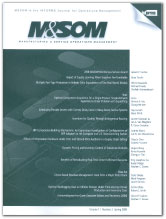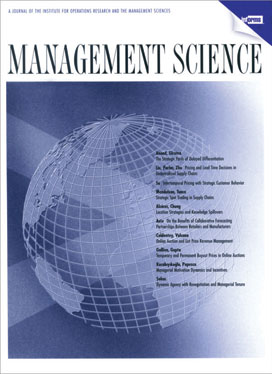Academic articles
Practitioner articles
Working papers
Books
Book chapters
Case studies
Other publications
Subject(s)
Product and operations management
Keyword(s)
Inventory rationing, optimal control, queuing theory
Volume
41
Journal Pages
1096–1109
Subject(s)
Product and operations management
Keyword(s)
advance demand information, production-inventory systems, inventory rationing, make-to-stock
We consider a make-to-stock supplier that operates a production facility with limited capacity. The supplier receives orders from customers belonging to several demand classes. Some of the customer classes share advance demand information with the supplier by announcing their orders ahead of their due date. However, this advance demand information is not perfect because the customer may decide to order prior to or later than the expected due date or may decide to cancel the order altogether. Customer classes vary in their demand rates, expected due dates, cancellation probabilities, and shortage costs. The supplier must decide when to produce and, whenever an order becomes due, whether or not to satisfy it from on-hand inventory. Hence, the supplier is faced with a joint production-control and inventory-allocation problem. We formulate the problem as a Markov decision process and characterize the structure of the optimal policy. We show that the optimal production policy is a state-dependent base-stock policy with a base-stock level that is nondecreasing in the number of announced orders. We show that the optimal inventory-allocation policy is a state-dependent multilevel rationing policy, with the rationing level for each class nondecreasing in the number of announced orders (regardless of whether the class provides advance information). From numerical results, we obtain several insights into the value of advance demand information for both supplier and customers.
© 2009 INFORMS
Volume
11
Journal Pages
128–143
ISSN (Online)
1526–5498
ISSN (Print)
1523-4614
Subject(s)
Product and operations management
Keyword(s)
epidemic control, game theory, optimization
This paper examines how two countries would allocate resources at the onset of an epidemic when they seek to protect their own populations by minimizing the total number of infectives over the entire time horizon. We model this situation as a game between selfish countries, where players strategically allocate their resources in order to minimize the total number of infected individuals in their respective populations during the epidemic. We study this problem when the initial number of infectives is very small, which greatly simplifies the analysis. We show in this framework that selfish countries always allocate their resources so as to bring the effective reproduction ratio below one and avoid a major outbreak. When a major outbreak is avoidable, we further identify the necessary and sufficient conditions under which the individual allocation decisions of selfish countries match the decision that a central planner would make in order to minimize the total number of infectives in the whole population (without distinguishing between countries).
With permission of Elsevier
Volume
222
Journal Pages
1–20
Subject(s)
Management sciences, decision sciences and quantitative methods
Keyword(s)
epidemic control, influenza, Reed-Frost model, supermodular games
Recent epidemiologic studies have suggested that the prophylactic use of antiviral drugs or imperfect vaccines could slow down the spread of an influenza epidemic. Since drug stockpiles are presently scattered in different countries, the outbreak of an epidemic gives rise to a game in which each country must make decisions about how best to allocate its own stockpile in order to protect its population. We develop a two-period multivariate Reed-Frost model to represent the spread of the epidemic within and across countries at its onset. Our model captures three critical sources of uncertainty: the number of initial infections, the spread of the disease, and drug efficacy. We show that for small between-country infection rates, the underlying game is supermodular and that a unique Pareto optimal Nash equilibrium exists. In this equilibrium, some countries give up all their drugs to protect the population where the epidemic first appeared, while all others keep their stockpiles for themselves. Further, we identify sufficient conditions under which the optimal solution of a central planner (such as the World Health Organization) constitutes a Pareto improvement over the decentralized equilibrium, suggesting that countries could agree on an allocation scheme which would benefitt everyone. By contrast, when the central planner's solution does not constitute a Pareto improvement, minimizing the total number of infected persons globally requires some countries to sacrifice part of their own population, which raises intriguing ethical issues. Preliminary numerical studies also indicate that similar results hold for the duration of the pandemic, with the difference that countries seem willing to give up their drug stockpiles for more sets of parameters than in the two-period case.
© 2009 INFORMS
Volume
57
Journal Pages
1320–1332
Subject(s)
Marketing
Keyword(s)
corporate social responsibility, stock risk, marketing-finance interface, advertising, research and development
Marketers and investors face a heated, provocative debate over whether excelling in social responsibility initiatives hurts or benefits firms financially. This study develops a theoretical framework that predicts (1) the impact of corporate social performance (CSP) on firm-idiosyncratic risk and (2) the role of two strategic marketing levers, advertising and research and development (R&D), in explaining the variability of this impact among different firms. The results show that higher CSP lowers undesirable firm-idiosyncratic risk. Notably, although the salutary impact of CSP is greater in firms with higher (versus lower) advertising, a simultaneous pursuit for CSP, advertising, and R&D is harmful with increased firm-idiosyncratic risk. For theory, the authors advance the literature on the marketing-finance interface by drawing attention to the risk-reduction potential of CSP and by shedding new light on some critical but neglected roles of strategic marketing levers. They also extend CSP research by moving away from the long-fought battle for a universal CSP impact and toward a finer-grained understanding of when some firms derive more risk-reduction benefits from CSP. For practice, the results indicate that the "goodwill refundßÂ" of CSP is not unconditional. They also empower marketers to communicate more effectively with investors (i.e., doing good to better manage the risk surrounding firm stock prices).
With the permission of the American Marketing Association
Volume
73
Journal Pages
198–213
Subject(s)
Marketing
Keyword(s)
utility-preference, estimation, theory, prospect theory, loss aversion
The silver lining effect predicts that segregating a small gain from a larger loss results in greater psychological value than does integrating them into a smaller loss. Using a generic prospect theory value function, we formalize this effect and derive conditions under which it should occur. We show analytically that if the gain is smaller than a certain threshold, segregation is optimal. This threshold increases with the size of the loss and decreases with the degree of loss aversion of the decision maker. Our formal analysis results in a set of predictions suggesting that the silver lining effect is more likely to occur when (i) the gain is smaller (for a given loss), (ii) the loss is larger (for a given gain), and (iii) the decision maker is less loss averse. We test and confirm these predictions in two studies of preferences, both in a nonmonetary and a monetary setting, analyzing the data in a hierarchical Bayesian framework.
© 2009 INFORMS
Volume
55
Journal Pages
1832–1841
ISSN (Online)
1526-5501
ISSN (Print)
0025–1909
Subject(s)
Strategy and general management
Keyword(s)
strategic innovation, business model innovation, competitive advantage, competitive strategy
British artist Damien Hirst is both controversial and successful. Jörg Reckhenrich, Jamie Anderson and Martin Kupp suggest that his innovative approach to life and work demonstrate strategies useful to organizations.
© 2009 The Author Journal compilation © 2009 London Business School
Volume
20
Journal Pages
40–47
Subject(s)
Economics, politics and business environment
Keyword(s)
computers, productivity
Volume
41
Journal Pages
1–10
Subject(s)
Technology, R&D management
Keyword(s)
customers, decision making, industrial services, services
Industrial product service systems (IPS²) are required to meet current customer needs in order to provide solutions to current customer problems. Furthermore, adaptability to changing customer decision drivers is required in order to account for customers' preference changes over time. The purpose of this paper is to present an approach where customer preference drivers for different IPS2 are identified and their directions analyzed.
With permission of Emerald
Volume
20
Journal Pages
640–653
Subject(s)
Management sciences, decision sciences and quantitative methods
Keyword(s)
exchangeable continuous data, maximum likelihood, correlation, accept-reject simulation
This article investigates the Farlie-Gumbel-Morgenstern class of models for exchangeable continuous data. We show how the model specification can account for both individual and cluster level covariates, we derive insights from comparisons with the multivariate normal distribution, and we discuss maximum likelihood inference when a sample of independent clusters of varying sizes is available. We propose a method for maximum likelihood estimation which is an alternative to direct numerical maximization of the likelihood that sometimes exhibits non-convergence problems. We describe an algorithm for generating samples from the exchangeable multivariate Farlie-Gumbel-Morgenstern distribution with any marginals, using the structural properties of the distribution. Finally, we present the results of a simulation study designed to assess the properties of the maximum likelihood estimators, and we illustrate the use of the FGM distributions with the analysis of a small data set from a developmental toxicity study.
With permission of Elsevier
Volume
6
Journal Pages
503–512



